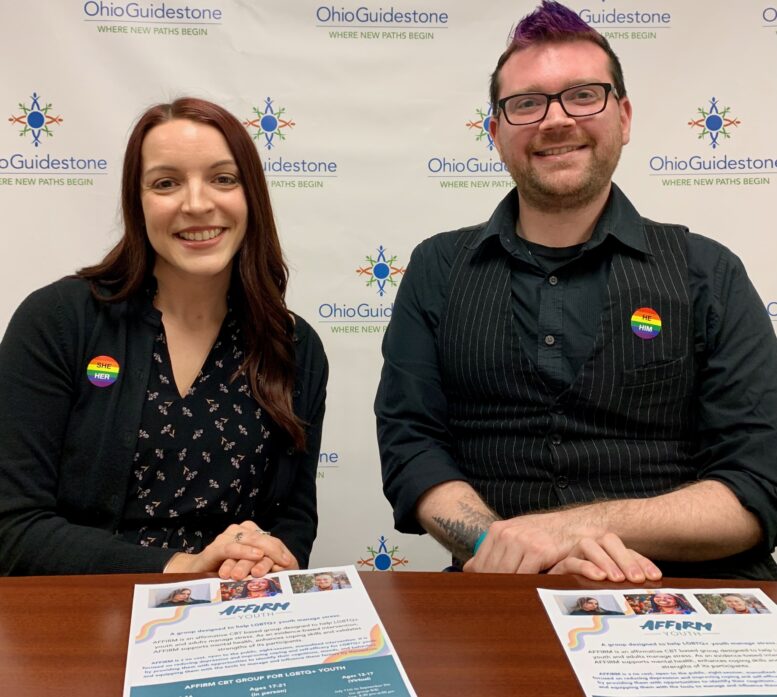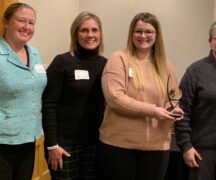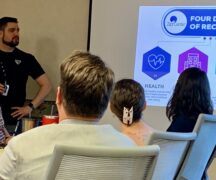By JULIE CARLE
BG Independent News
Northwest Ohio youth who identify as LGBTQ+ or who are questioning their identities can learn how to navigate the physical and emotional stresses they often face.
OhioGuidestone is offering AFFIRM Youth intervention groups designed to help LGBTQ+ youth between the ages of 12 and 21 manage stress, enhance coping skills and validate their strengths. There is no cost to participate.
“Suicide rates and other mental and behavioral health statistics skyrocket for marginalized communities, and the statistics keep compiling when you have other intersecting identities,” said Bret Williamson, the OhioGuidestone clinical counselor who will facilitate the groups.
The goal is to improve access to services for LGBTQ+ youth in Wood and Lucas counties, where resources are limited, said Victoria Graham, OhioGuidestone regional director for northwest Ohio. For example, in Bowling Green, many local resources are geared more toward Bowling Green State University students.
“We know the rates of those who identify in this community are much higher in the new generation,” Graham said. “We want to provide services now so this generation doesn’t have to go through some of the terrible experiences growing up that older generations did.”
Treatment for LGBTQ+ clients is part of OhioGuidestone’s existing services; these exclusive-to-youth AFFIRM groups are set up to be preventative.
This new format “eliminates barriers for individuals having to come into the office and go through the full process to become a client,” Graham explained.
Instead of going through the more traditional assessment-diagnosis-scheduling process, individuals will be able to participate after providing informed consent.
The AFFIRM approach uses proven, evidence-based practices and integrates identity affirmation with cognitive behavioral therapy to improve well-being. Williamson received the intensive AFFIRM Research training and is prepared to lead the groups.
Based in mindfulness
The sessions, grounded in mindfulness practices, will include discussions about “what it’s like to be LGBQ+ in this area and in this generation,” he said. They will look at the stressors that are common for LGBTQ+ youth, develop coping skills, learn how to deal with anxiety and depression and talk about building hope and resilience.
About halfway through the eight weeks, Williamson will introduce the Hope Box activity. “They can bring little items that give them hope and demonstrate resilience so they can carry that with them anywhere that they need it,” he said.
Williamson regularly checks in with participants to find out how they are feeling, and at the end of each group meeting, they will set intentions for the coming week.
“We will really be teaching how to focus on our thoughts and behaviors to help ensure our emotions are manageable when we deal with things outside of this room,” he said.
Individuals do not have to be out to participate and gain the skills, he added.
After the eight weeks, if participants feel they need more support, OhioGuidestone will help link them to treatment services within their agency or with other local resources.
Attendance at all eight group sessions is encouraged but not mandatory, Graham said. “If you have a family vacation planned during the summer, don’t let that prevent you from registering.”
The first meeting is important because it sets the stage for the rest of the sessions. “The first one will be an orientation where you get to know me and one another, and what it’s going to be like,” Williamson said.
There is an expectation of confidentiality, which is important to create an environment of safety and a sense of community.
He also encouraged parents to reach out for more information and to “demystify the program,” so they clearly understand what their child is participating in.
Group session schedules
Two in-person sessions (one in Perrysburg and one in Bowling Green) and one virtual session are planned, starting as early as next week. Details are listed below.
The Perrysburg group is for 12- to 16-year-olds and the Bowling Green group is for 17- to 21-year-olds. The virtual group is for 13- to 17-year-olds.
“We didn’t want to put age groups together because they are different developmentally,” Graham said. “We wanted to make sure it was developmentally appropriate for everybody, and that everyone, the youth and the parents, felt comfortable.”
The sessions are as follows:
In person for ages 12-16
Mondays starting May 6-June 24, 4:30-6 p.m.
Ohio Guidestone (Wood County)
885 Commerce Drive, Perrysburg
In person for ages 17-21
Wednesdays starting May 8-June 26, 4:30-6 p.m.
NAMI Wood County
1250 Ridgewood Dr., Bowling Green
Virtual for ages 13-17
Thursdays starting July 11-Sept. 5, 4:30-6 p.m.
(no group 8/8)
To register or get more information, contact Debra Bailey at 419-349-5989 or debra.bailey@ohioguidestone.org
“We are here to say, ‘Hey, this is okay, and you are not alone,’” Graham said. In addition to providing coping skills, the groups are set up to create community. It’s not just Bret teaching them, it’s all of them working together and being able to support each other.”



